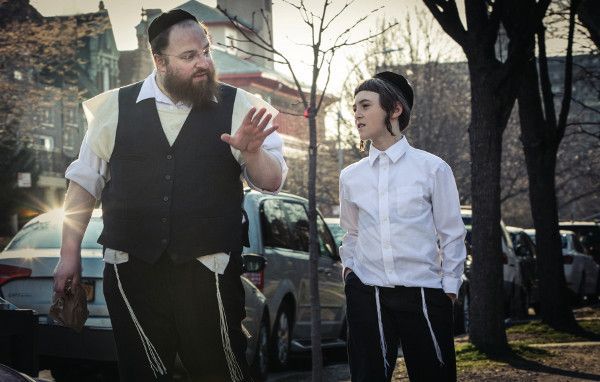Eye For Film >> Movies >> Menashe (2017) Film Review
Menashe
Reviewed by: Amber Wilkinson

"Start acting like a mensch." This is the admonishment that Hasidic Jew Menashe (played by comic Menashe Lustig and based loosely on his own life) seems to have continually ringing in his ears, not just from friends and family but also from his own conscience. The problem is, outward appearances suggest his faith is not enough to stop him being something of a klutz, albeit a sympathetic one. His personality is just part of the problem, widowed some months previously, his community expect him to remarry in double-quick time or face the fact that his young son Rieven (Ruben Niborski) will have to go to live with Menashe's menscher-than-thou brother-in-law Eizik (Yoel Weisshaus). The idea of remarriage is unpalatable not just because of grief but because Menashe is wrestling with a whole slew of emotions about the death of his wife, not least of them guilt.
There have been other films about the Hasidic community before, such as Boaz Yakin's A Price Above Rubies, Rama Burshtein's Fill The Void (which received rabbinical approval) and Maxime Giroux's Felix and Meira but they frequently either over-romanticise the religion treat or it as strange curiosity to be scrutinised. Joshua Z Weinstein, who has a raft of documentary filmmaking already under his belt, takes a refreshingly clear-eyed approach to this story and, rather than hand-hold his audience through the ins and outs of day-to-day life in the ultra-Orthdox community in Brooklyn, he shows what is happening without getting bogged down in explanation.

Instead of picking apart rituals, such as morning handwashing (Netilat Yadayim) or the preparations for the memorial for Menashe's wife, Weinstein simply lets us see them in action as part of the natural fabric of Menashe's life and it's worth noting, as Lustig did at the screening of the film in Berlin, that the movie is kosher.
The director doesn't shy away from issues such as the mental "pressure" of having to remarry so soon after a spouse's death or the position of women within the faith but keeps the father/son relationship front and centre, leavening the deeper emotional issues with a gentle humour that further points to Menashe's general haplesness. He also generates considerable sympathy for Menashe by showing that juggling personal needs and desires within the framework of a strict religious environment is not easy. Rieven is also a strong character in his own right, as we see him grappling with the loss of one parent and the prospect of losing day-to-day contact with the other alongside the usual childhood frustrations with a dad who is less than perfect.
This is not a film about character revelation and Damascene conversion so much as Rieven and his father writing a new rule book and Menashe reconciling with himself, and it's all the stronger for that.
Reviewed on: 28 Mar 2017
















